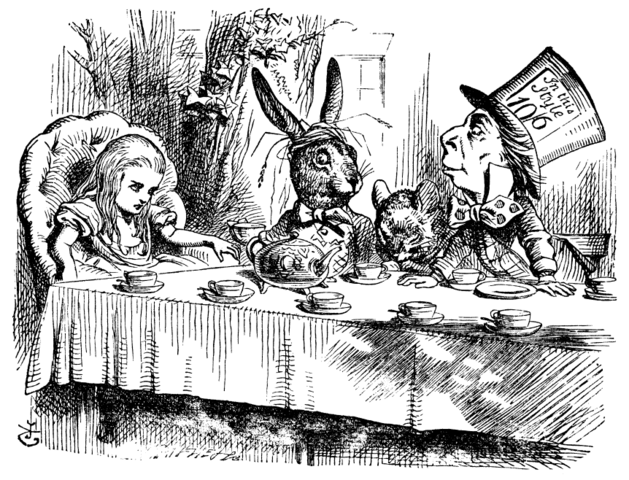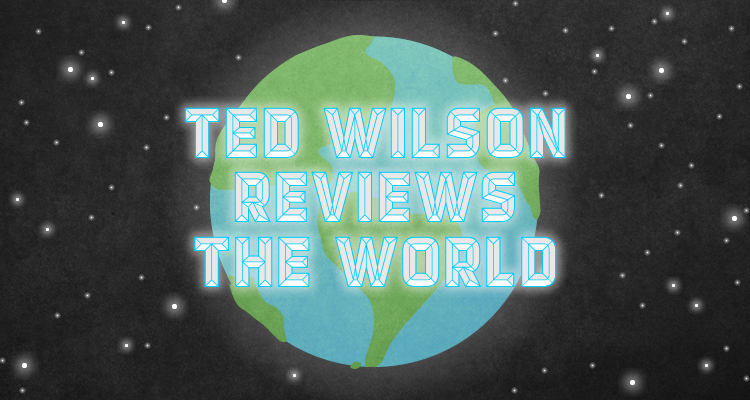essays
Alice in Guantánamo: Reading Carroll in the Gitmo Age

“Who was in front of me in the truck?” Mohamedou Ould Slahi asks the other detainees, on their first morning in Guantánamo. “He kept moving, which made the guards beat me all the way from the airport to the camp.” The line, from Slahi’s Guantánamo Diary (Little Brown, 2015) reads like the finish to a grim and weary joke. To beat one detainee is a cruelty; to beat the wrong one is nonsense.
Guantánamo’s non-sense draws comparisons to Kafka and Orwell, but to me the touchstone is Lewis Carroll. Alice’s Adventures in Wonderland, which had its 150th anniversary on November 26, and Through the Looking Glass capture the ambitious inversions of Gitmo, where the iguanas that skitter out of the jungled camps enjoy more legal protection than the men inside. As a young attorney fresh to the ‘Guantánamo bar,’ I heard counsel for the Uighur detainees tell that one at a fundraiser: if your jeep hits an iguana, you risk a $10,000 fine under the Endangered Species Act on a road where the Constitution doesn’t apply.
No, that can’t be right at all, I thought. This was 2009 and I’d just joined the legal team representing one of the Tunisian detainees. I was prepared to confront all sorts of sinister systems, but not horsefeathers. Assume black is white and white black in that legal twilight zone — “every writer may adopt his own rule,” writes Charles Dodgson, the Oxford logician better known as Lewis Carroll, “provided it is consistent with itself and the accepted facts of Logic.”
Courts and lawyers take refuge in Carroll, whose nonsense books so profoundly champion logic. The Queen of Hearts’ famous theory of due process — “sentence first, verdict afterwards!” — has become a judicial shorthand for injustice, cited alongside Galileo’s heresy trial and the Salem witchcraft trials. In 2008, in one of the most important Gitmo precedents, a federal appeals court riffed on Carroll in rejecting the government’s theory that classified, second-hand evidence was reliable where it appeared in three different intelligence reports: “Lewis Carroll notwithstanding, the fact that the government has ‘said it thrice’ does not make an allegation true.”
Certainly, there is something satisfying in ridiculing Guantánamo. Slahi’s Diary, for one, shows a terrific eye for irony: the guards who torture him, but consider him their friend; the sign in the detainee interrogation room, “Honor bound to defend freedom”; the Mauritanian “Secret Police” who are more easily recognized than regular police forces. “The authorities,” says Slahi, “should think about a new nomenclature, something like ‘The Most Obvious Police.’” There is power in puncturing the War on Terror’s saturnine rhetoric as nonsense.
This is how those with no leverage — children against adults, prisoners against their wardens — resist arbitrary power through the force of principle.
But more important, I think, is Alice, and her simple insistence on logic in the face of absurdity: “Stuff and nonsense! The idea of having the sentence first!” she shouts at the Knave’s Trial. This is how those with no leverage — children against adults, prisoners against their wardens — resist arbitrary power through the force of principle. “Common sense dictates,” writes Slahi, “that after three years of interrogating me and depriving me of my liberty, the government at least owes me an explanation of why it’s doing so.” This is the shape of justice’s painfully long arc in Gitmo: in 2010, after eight years of detainees, lawyers, and courts insisting on basic rule of law and due process, Slahi would get his explanation. He is still detained.
What is it to read Alice, a century and a half after its creation, in the era of Guantánamo? For me, it is to understand ‘nonsense’ not as children’s fantasy but as a riptide in the human mind, which drags us further off course the more violent or conceited or certain we are. It is to articulate what is so wrongheaded in Gitmo — to acknowledge men serving thirteen years of sentence before any verdict, and to insist on simple principle in the face of sophisticated explications.
“Nonsense!” said Alice, very loudly and decidedly, and the Queen was silent.
***
“Please, your Majesty,” said the Knave, “I didn’t write it, and they can’t prove that I did: there’s no name signed at the end.”
“If you didn’t sign it,” said the King, “that only makes the matter worse. You must have meant some mischief, or else you’d have signed your name like an honest man.”
There was a general clapping of hands at this: it was the first really clever thing the King had said that day.
“That proves his guilt, of course,” said the Queen: “so, off with — ”
“It doesn’t prove anything of the sort!” said Alice. “Why, you don’t even know what they’re about!”
– Alice’s Adventures in Wonderland, Chapter XII
Guantánamo’s defenders assured us that anything unsavory that happened in the camp was justified; it kept us safe. In this sense, to leave high-value detainees untortured is negligence: it would mean leaving life-saving intelligence on the table and risking more deaths for the sake of fusspot scruples. Coming from a military family, I was more prepared than most to believe this. But in reading Slahi’s Guantánamo Diary, the only thing that shocked me more than the harsh details of his interrogation was its incompetence.
Slahi’s interrogations read like amateur hour. At one point, his American interrogators forge a letter from his brother, but get the brother’s name and address wrong, and misspell Slahi’s name. “What a jackass,” Slahi keeps thinking of his guards. They stand Slahi in a frigid room walled in photos of arsenals, fighter jets, and George W. Bush, while the National Anthem blasts: “We’re the greatest country in the free world,” the guard insists, “and we have the smartest president in the world.”
It’s just embarrassing. Next to the sinister expertise of the Jordanian secret police, we seem like dilettantes, like the King of Hearts trying gamely to parse meaning from nonsense verses. Here’s a gem from Slahi’s American interrogation:
“What do you mean by tea and sugar?”
“I mean tea and sugar.” I cannot tell you how many times the U.S. asked me, and made other people ask me, this question.
(Canadian intelligence had once intercepted a call in which Slahi discussed tea, and passed it on to the United States.)
“What the fuck do you mean, tea or sugar?”
“I just meant what I said, I was not talking in code.”
“Fuck you!”
Slahi supposes the Americans were so impressed with their Jordanian allies’ practice of torturing suspects, they started to try their hands at it, “though shyly.” But they were awful at it. The result of all their Jack Bauer playacting was intelligence of little to negative value, since they told Slahi what to say. “We want you to give evidence linking _______ to the Millenium Plot,” his Gitmo handler explains, “Things like, he supports the Mujis or believes in Jihad are good, but not good enough to lock him up the rest of his life.” Predictably, this resulted in false accusations, then bungled prosecutions: whoever ________ was, he was released unconditionally in 2005.
And yet clumsiness is its own method of domination. There’s a reason stupidity is sometimes called invincible.
Stupidity like this breeds cynicism. At one point, the Mauritanian director of intelligence admits to Slahi he knows Slahi had nothing to do with 9/11, but is rendering him to Jordan anyway, at the U.S.’s request; when Slahi asks why Mauritania won’t protect its citizen from injustice, the director shrugs: “America is a country that is based on and living with injustice.” “Who cares for you?” Alice says to the Queen of Hearts: “You’re nothing but a pack of cards!”
And yet clumsiness is its own method of domination. There’s a reason stupidity is sometimes called invincible. “I wish you’d make a mistake, any mistake, so I can strike,” one guard says to Slahi while performing “corny fake martial arts” moves outside his cell. “You call me Master, OK?” Irrationality declares it is not confined by logic or even self-interest. The King of Hearts does not actually care about truth-finding, only about feeling clever and powerful. But this isn’t safety. How much time, resources, and credibility did we waste on pumping bad intel into and out of Slahi? Especially today, in the wake of deadly terrorist attacks in Paris and Beirut, it’s grotesque to pretend this is national security.
“When I use a word,” Humpty Dumpty said, in rather a scornful tone, “it means just what I choose it to mean — neither more nor less.”
“The question is,” said Alice, “whether you can make words mean so many different things.”
“The question is,” said Humpty Dumpty, “which is to be master — that’s all.”
– Through the Looking Glass, Chapter VI
Lewis Carroll’s riff on linguistic empiricism in Through the Looking Glass remains one of the most popular ways for judges to insult each other’s statutory interpretations as strained and self-serving. There’s mischief, we suspect, in semantic arguments: a way of talking our way out from under the truth. The War on Terror’s novel vocabulary has done little to convince us otherwise. Isn’t it obvious “unlawful combatant” was ginned up to sidestep the Geneva Conventions? What about that Bond-villain locution, “enhanced interrogation”?
Euphemizing this as “special” or “enhanced” interrogation is indeed “making a word do a lot of work,” as Humpty Dumpty puts it.
Call a spade a spade: Slahi’s “special interrogation plan” was torture. The interrogators beat him; sexually humiliated and assaulted him; shackled him in stress positions for hours; subjected him to months of sleep deprivation through 24-hour interrogations, blasting music, light strobes, and frigid temperatures; stood him in the cold room naked or soaked in ice water; forced him to drink saltwater; and staged a mock rendition that terrified even his interrogator. Euphemizing this as “special” or “enhanced” interrogation is indeed “making a word do a lot of work,” as Humpty Dumpty puts it.
But Carroll the logician agreed with his egghead: “any writer of a book is fully authorised in attaching any meaning he likes to any word or phrase he intends to use,” he stated in Symbolic Logic. Language is contingent; a word doesn’t have any necessary, definite meaning. “Torture” is defined one way in statute, another way in dictionaries. People disagree over whether water-boarding is torture and there is no empirical way for either side to win their argument.
In law school, I had the unnerving honor of debating John Yoo, author of the “torture memos,” on the definition of torture. He sat as a practice judge for our international law moot court team, an impossibly gracious gift of his time, considering the prompt that year was whether we should throw him in prison for crimes against humanity. The competition may as well have captioned its case Republic of Adova v. Schmon Schmoo. I cited my treaties and precedents — there are a lot of them — to argue cold rooms and stress positions fit the Torture Convention’s standard for severe pain or suffering, and Professor Yoo countered with the question at the heart of the Bybee memo: where is the line? What is severe enough cold? 49 degrees? What about 53, or 55 degrees? Is four hours in a cold room torture? Three? Two?
My response was correct and unsatisfying: We can identify torture without deciding its precise boundaries. “I don’t know exactly where my nose ends and my forehead begins,” I said, “but I know my nose isn’t my forehead.” That even sounds like Alice — sensible, stubborn, stumped. Yoo was not impressed. I’m pretty sure he knows just where his forehead starts; he went to Yale.
The most egregious problem about Yoo’s torture memo is not necessarily its analysis, but its conception. The military interrogators wanted to know exactly how far they could push coercive physical and mental suffering, so they could go right up to that line. Yoo’s analysis attempted to cabin the word “torture,” to “master” it. “This is a case where people want the law to provide answers, to dictate with certainty what you are and are allowed to do,” Yoo told PBS Frontline in 2005. “The one thing I think we don’t want is for the government to be hamstrung […] because we have so much disagreement about what those phrases mean.” But courts can make the word mean so many different things. So can the media; so can the public. Semantics are democratic. There’s glory for you.
Isn’t that how we want it to be? Ambiguity here has a useful deterrent effect. I don’t particularly want to live in a country where people who beat and humiliate another human being don’t have to worry they might be committing torture. Maybe they feel what they do is necessary — maybe they know, like one of Slahi’s guards admitted, that they’re going to hell for what they’re doing. Whatever the case, they should be afraid of an unmastered word.
“Well, it’s no use your talking about waking him,” said Tweedledum, “when you’re only one of the things in his dream. You know very well you’re not real.”
“I am real!” said Alice, and began to cry.
“You won’t make yourself a bit realer by crying,” Tweedledee remarked: “there’s nothing to cry about.”
“If I wasn’t real,” Alice said — half-laughing through her tears, it all seemed so ridiculous — “I shouldn’t be able to cry.”
“I hope you don’t suppose those are real tears?” Tweedledum interrupted in a tone of great contempt.
– Through the Looking Glass, Chapter IV
Guantánamo housed the “worst of the worst,” supposedly.Slahi arrived in August 2002 and was early on treated as the camp’s No. 1 high-value detainee, accused of coordinating the 9/11 hijackers; at different times, the U.S. alleged he masterminded the Millenium Plot to bomb LAX airport and/or was a senior recruiter for Bin Laden. But by the time a federal court reviewed Slahi’s detention, in 2010, the U.S. alleged only he was “part of” al Qaeda, and lost. The D.C. Court of Appeals then loosened the standard for what being “part of” al Qaeda means, and the case remains pending.
Like Alice in the Red King’s dream, the Slahi in detention is a dreamed figure, a dark fantasy projected on to a body that was at hand.
Like Alice in the Red King’s dream, the Slahi in detention is a dreamed figure, a dark fantasy projected on to a body that was at hand. He is the terrorist mastermind, the shadow’s shadow, the shape of our post-9/11 fears and vulnerability. “Stop praying, Motherfucker,” a guard screams at Slahi, punching him in the mouth, “you’re killing people!” The nightmare Slahi is so powerful, his mere prayers are deadly.
The narrative arc of Guantánamo Diary — indeed, its very existence — is Slahi’s attempt to assert his own identity against his captors’ hallucinations: “I was eager to let my predator know I am, I am.” His diary, its carefully documented suffering, fear, and longing, is a desperate argument for his existence outside the government’s narrative. Like Alice says: “If I wasn’t real, I shouldn’t be able to cry.”
Perhaps sensing this, his interrogators’ persistent threat is to wipe him from their database and disappear him to “a hole where nobody knows about you.” (“You’d be nowhere,” Tweedledee tells Alice, if the Red King left off dreaming of her; “you’d go out — bang! — just like a candle.”) The goal of Slahi’s physical and psychological torture is to make him confess to the crimes that the U.S. has convinced itself he’s done. Until then, every protestation of innocence is his lack of cooperation, his demands for a trial are a cynical exploitation of our freedoms, and his suffering is cunning crocodile tears. At one point, the censors editing his diary literally redact his tears:
When he said that I couldn’t help breaking in ____. … Just one soothing word in this ocean of agony was enough to make me cry.
Of the Red King’s dream, Bertrand Russell wrote, “A very instructive discussion, from a philosophical point of view. But if it were not put humorously, we should find it too painful.”
It is painful to read Slahi’s words. It makes me feel like an asshole, because I had my own dream of him while working on Gitmo: He was the rat who mucked up his fellow detainees’ cases with false accusations, in exchange for a VCR, a PlayStation console, and a “gilded cage.” Now that I understand what he endured up to his breaking point, I can’t resent him. I don’t know who Slahi really is and I never will, but in his Diary I have an alternate figment, a man of simple principles, keen ironies, and strange lyricisms: “my street clothes had become so loose,” Slahi writes, “that I looked like a small cat in a big bag.” Dreams and dreaming haunt him. In one brutal recurring dream, his illusory family tries to persuade him his dream is reality, and the waking nightmare is finally over:
“Am I with you for real, or is it a mere dream?”
“No, you’re really at home!”
For thirteen years, Mohamedou Ould Slahi has lived within Guantánamo’s dream of him, while his Diary places Guantánamo in his own narrative — another dream, the U.S. would argue, with its own lies and misperceptions. Which dreamed it? Carroll asks us at the end of Through the Looking Glass, and, as with Slahi and his captors, we’ll never truly figure it out.
Nonsense has no resolution; absurdity is only the last step of the logical proof that demonstrates a rotten premise. I had to leave my own Gitmo case with no resolution, although happily, my guy was ultimately released. Slahi was not — he remains part of the one hundred and twelve trapped in that morbid American dream, charged with nothing but suspected of anything.
In a Wonderland they lie,
Dreaming as the days go by,
Dreaming as the summers die.









